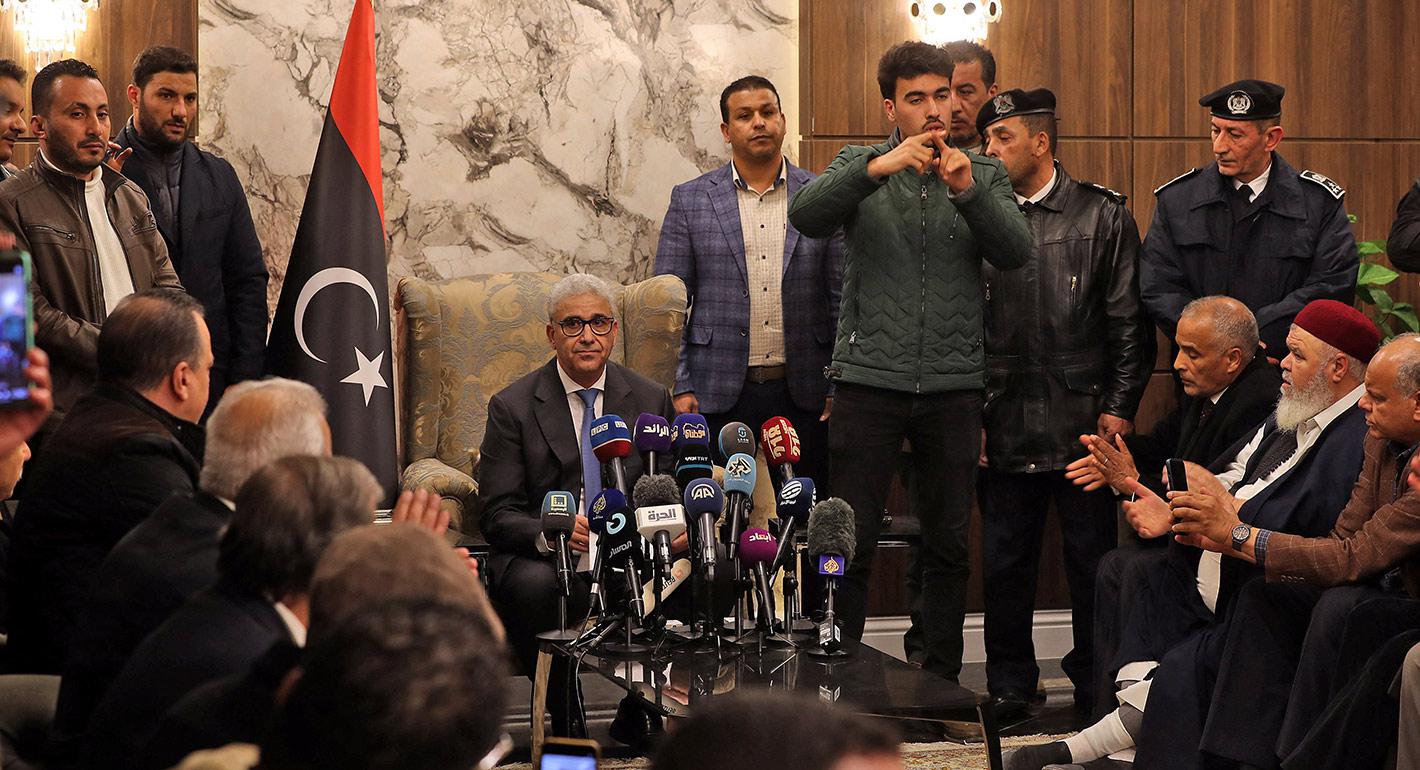{
"authors": [
"Sghaier Hidri"
],
"type": "commentary",
"blog": "Sada",
"centerAffiliationAll": "",
"centers": [
"Carnegie Endowment for International Peace"
],
"collections": [],
"englishNewsletterAll": "",
"nonEnglishNewsletterAll": "",
"primaryCenter": "Carnegie Endowment for International Peace",
"programAffiliation": "",
"programs": [],
"projects": [],
"regions": [],
"topics": []
}
Source: Getty
Libya: Tough Choices After Bashagha’s Failure
The showdown between Libya’s rival prime ministers could continue indefinitely unless Turkey plays a more assertive mediation role.
After several months of stalemate, the parliament-appointed prime minister, Fathi Bashagha, failed to overthrow his rival, Abdelhamid Dabaiba, the head of the interim national unity government who was appointed prime minister through a UN-backed process last year. So far, Dabaiba has refused to cede power. For that reason, on the night of Friday, August 26, 2022, Bashagha, accompanied by allied fighters, stormed into Tripoli in an attempt to take over the government in a swift military offensive. However, he was quickly met by opposition from forces aligned with Dabaiba, and clashes between the two rival militia groups ensued, leaving at least 32 civilians dead.
During these clashes—the most dangerous since the commander of the Eastern Libyan Forces, Khalifa Haftar, launched a campaign to seize Tripoli two years ago—the forces loyal to Dabaiba succeeded in taking control of the 777 Brigade headquarters and cutting off any reinforcements from reaching the pro-Bashagha fighters.
The 777 Brigade, an armed formation created by the former commander of the Tripoli Revolutionaries Brigade, Haitham al-Tajouri, was one of the most prominent brigades supporting Bashagha. It controlled sensitive areas in the Libyan capital such as the port of Tripoli, as well as several points in the Friday market, which includes Mitiga airport and the Bousta naval base. The brigade hoped to carry out an internal coup against Dabaiba, but the preemptive strike he launched succeeded in neutralizing it.
The end of the battle also marked a dramatic end for Major General Osama Al-Juwaili, the former Director of Intelligence, whose forces were bombed by drones as they moved from Misrata to Tripoli. Al-Juawili had earlier turned against the outgoing Prime Minister Dabaiba and joined the camp of his opponent Bashagha.
This is the largest clash of its kind between the militias of Bashagha and Dabaiba after the one which occurred last May between brigades led by the Stabilization Support Organization in support of the unity government, and the Al-Nawasi Brigade, led by Mustafa Kaddour. The latter provided protection for Bashagha upon his entry to Tripoli and sheltered him before he was forced to leave amid a barrage of bullets.
The defeat of the forces of Al-Juawili and Al-Tajouri caused a political and military setback to Bashagha, who has recently escalated his threats to force his way into Tripoli and assume power from the resisting Dabaiba.
As the situation currently stands, the future of executive power in Libya is a matter of speculation. There seems to be no comprehensive political settlement—as both sides are firmly committed to turn to war. The absence of a possible political solution increases the risk of an imminent crisis, as the deadlock can only end by Bashagha standing down and allowing Dabaiba to maintain his position until elections are held, or by Bashagha resorting to military force, which is unlikely to yield fruitful results for him. A third option could be the transfer of power to a third party while a new political roadmap leading to elections is negotiated and established. However, since there are no plans to hold elections anytime soon, the future remains uncertain, making Libyan leaders reluctant to cede power or leave office.
Bashagha seems discouraged after his successive military failures, especially as resentment is becoming prevalent among his supporters in the parliament and in the armed militias in Eastern and Western Libya. In fact, Libyan parliamentarians are reconsidering the legitimacy of Bashagha’s government, a position that may very well tip the balance of power towards Dabaiba if negotiations between the two parties are launched. In a closed parliamentary session held in Benghazi on Thursday, September 15th, members of parliament sharply criticized Bashagha, asking about the location of the headquarters of his parallel government.
Dabaiba’s situation is not much better than that of his opponent since he only controls Tripoli and no longer exercises total control over Western Libya. This could push Turkey, who deploys troops and mercenaries of different nationalities in the area, to reconsider its support for him, especially since Ankara is currently mediating a solution.
Turkey, which has a positive relationship with the Tobruk-based House of Representatives, has suggested the formation of a government independent of the two rival parties. In doing so, Turkey hopes to maintain an image of neutrality and to help the parliament avoid public embarrassment, especially after the visit of Aguila Saleh, head of the parliament, to Ankara last August.
If this happens, Turkey will immediately oppose the memorandum of understanding it signed with the former Government of National Accord in 2019 and, through the calming of the eastern Libyan camp, will seek to consolidate its influence in the Russian-controlled eastern parts of the country.
Although the proposal to form an independent government may face opposition from Dabaiba, who has succeeded in establishing the influence of his wealthy family during his year in power, it is likely that the two men will accept this solution if it guarantees their survival in the political arena and offers them a chance to run in the expected presidential elections. However, such elections do not appear to be taking place any time soon!
Sghaier Hidri, a Tunisian journalist specializing in Libyan and Tunisian affairs, worked for the London-based Al-Arab newspaper from 2019 to 2022, in addition to several Arab websites and newspapers such as Al-Nahar, Al-Arabi, and Pier 22. Follow him on Twitter @HidriSghaier.
About the Author
Sghaier Hidri
Carnegie does not take institutional positions on public policy issues; the views represented herein are those of the author(s) and do not necessarily reflect the views of Carnegie, its staff, or its trustees.
